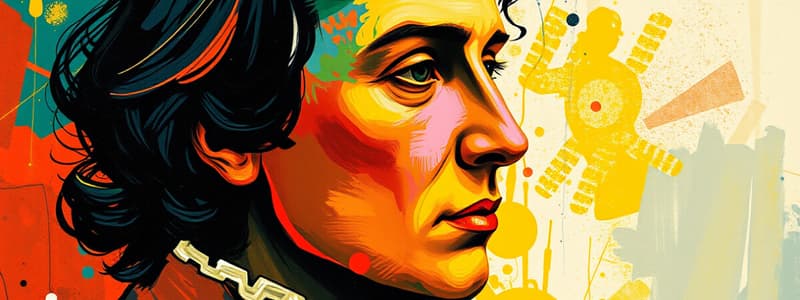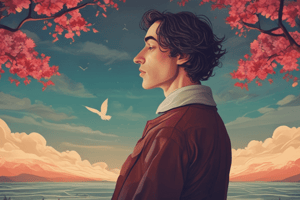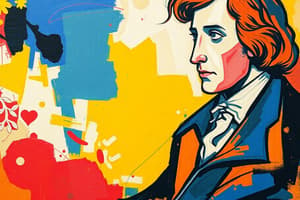Podcast
Questions and Answers
What era is John Keats associated with?
What era is John Keats associated with?
- Renaissance Era
- Romantic Era (correct)
- Victorian Era
- Modernist Era
Which of the following is NOT a type of poetry written by John Keats?
Which of the following is NOT a type of poetry written by John Keats?
- Odes
- Haikus (correct)
- Epics
- Sonnets
Which poem was written by Keats in the year 1819?
Which poem was written by Keats in the year 1819?
- The Prelude
- To a Nightingale (correct)
- The Love Song of J. Alfred Prufrock
- Ode to a Grecian Urn
How did John Keats' reputation change after his death?
How did John Keats' reputation change after his death?
What was the primary focus of John Keats' poetry?
What was the primary focus of John Keats' poetry?
What was John Keats' formal education like?
What was John Keats' formal education like?
What job did John Keats first have in medicine?
What job did John Keats first have in medicine?
Which of the following statements best describes Keats' contributions to literature?
Which of the following statements best describes Keats' contributions to literature?
Who were John Keats' contemporaries in the Romantic era?
Who were John Keats' contemporaries in the Romantic era?
What significant life event occurred for Keats in 1804?
What significant life event occurred for Keats in 1804?
Flashcards are hidden until you start studying
Study Notes
John Keats: Overview
- John Keats (1795-1821) was a notable English Romantic poet, part of the second generation alongside Lord Byron and Percy Bysshe Shelley.
- His poetry is characterized by vivid imagery, emotional depth, and philosophical exploration through classical legends.
- Reputation surged posthumously, gaining admiration during the Victorian Age and influencing poets like Alfred Lord Tennyson.
Early Life and Education
- Born to a stable manager, Keats had limited formal education and faced family loss early, with his father's death in 1804.
- Grew up with a close bond to his sister Fanny and brothers George and Tom, living with their grandmother in Middlesex.
- Attended Enfield school, noted for his aggressive demeanor, and developed a passion for reading around 1809.
Medical Training and Transition to Poetry
- Trained as a surgeon in 1811 but abandoned the career in 1814 to pursue a literary path in London.
- Worked as a dresser at Guy’s and St. Thomas’ hospitals before fully committing to poetry by 1817.
- Keats's life post-1817 closely mirrored his poetic output, illustrating the deep connection between his experiences and his work.
Major Works and Contributions
- Authored sonnets, odes, and epics, with a prolific creative output in 1819.
- Key works from 1819 include "Lamia," "The Eve of St. Agnes," and notable odes: "To a Nightingale," "On Melancholy," and "To Autumn."
- Produced two unfinished versions of an epic titled "Hyperion."
- Keats is celebrated for his ability to collect, organize, and convey sensory experiences, enriching literature with his observations and aesthetics.
Studying That Suits You
Use AI to generate personalized quizzes and flashcards to suit your learning preferences.




